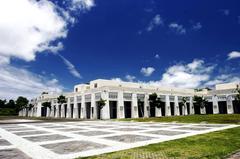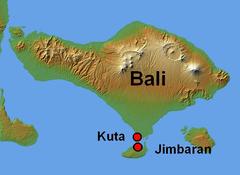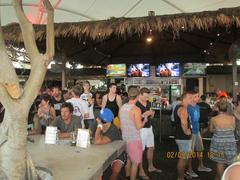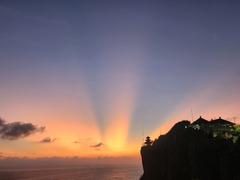
Canggu Visiting Hours, Tickets, and Top Attractions in Badung, Indonesia
Date: 04/07/2025
Introduction: Why Visit Canggu?
Nestled on Bali’s southwestern coast in Badung Regency, Canggu seamlessly blends its agrarian roots with modern surf culture, wellness retreats, and a thriving digital nomad scene. Once a quiet village surrounded by rice paddies and sustained by the traditional subak irrigation system, Canggu has evolved into a cosmopolitan hub that retains its authentic Balinese character. Its appeal lies in the harmony between local traditions and contemporary lifestyles—where centuries-old temples coexist with beach clubs, yoga studios, and creative markets.
Whether you’re drawn by world-class surf spots like Batu Bolong, Echo Beach, and Berawa Beach, enchanted by the spiritual allure of Tanah Lot Temple, or eager to explore vibrant cafés and artisan boutiques, Canggu promises a multifaceted experience for every traveler. This guide provides in-depth insights into Canggu’s history, cultural identity, and practical visitor information, including visiting hours, ticketing, accessibility, accommodations, transportation, and essential travel tips.
For detailed background and further reading, see Balipedia, Indonesia Impression Tour, and Canggu Bali Travel Guide 2025.
Table of Contents
- Introduction
- Canggu’s History and Cultural Evolution
- Top Attractions & Activities
- Practical Visitor Information
- Transportation and Accommodation
- Health, Safety, and Budgeting
- Sustainable Travel and Local Etiquette
- Frequently Asked Questions (FAQ)
- Conclusion & Travel Resources
Canggu’s History and Cultural Evolution
From Agrarian Village to Global Destination
Canggu’s origins lie in its lush rice fields and close-knit Balinese community, governed by the subak irrigation system—a UNESCO-recognized tradition reflecting the island’s commitment to harmony between people, nature, and spirituality (Balipedia). Despite Dutch colonial encounters from the 16th century onward, Canggu’s rural lifestyle persisted well into the 20th century. The surge of international tourism in Bali during the 1920s and 1930s bypassed Canggu in favor of more accessible regions, preserving its authentic character.
The late 20th century saw Canggu’s transformation as surfers discovered its consistent breaks and laid-back atmosphere. The digital nomad wave of the 2010s further accelerated its evolution, introducing co-working spaces, wellness centers, and a cosmopolitan energy while maintaining a strong connection to Balinese Hinduism and community rituals (Indonesia Impression Tour).
Balinese Hinduism, Subak, and Surf Culture
Balinese Hinduism permeates daily life in Canggu, visible in the canang sari (daily offerings), processions, and temple ceremonies that animate the streets. The subak irrigation system, central to rice cultivation, is guided by the Tri Hita Karana philosophy—harmony between humans, nature, and the spiritual world. Surfing, introduced by foreign adventurers, now acts as a cultural bridge, fostering community and environmental stewardship through local surf schools and beach clean-ups (Salt in Our Hair).
Top Attractions & Activities
Iconic Beaches and Surf Spots
- Batu Bolong Beach: The heart of Canggu’s surf scene, perfect for beginners and intermediates, with lively beach bars and sunset gatherings (Canggu Bali Travel Guide 2025).
- Echo Beach (Pantai Batu Mejan): Known for challenging waves favored by experienced surfers and its laid-back beachfront cafés.
- Berawa Beach: Offers a relaxed vibe with wide sands, kite surfing, and renowned beach clubs like Finns Beach Club.
Temples and Historical Landmarks
- Tanah Lot Temple: Bali’s iconic sea temple, perched offshore and famed for its sunsets. Open daily 7:00 AM–7:00 PM; entrance fee approx. IDR 60,000 (Canggu Bali Travel Guide 2025).
- Pura Batu Mejan: A smaller seaside temple near Echo Beach, open during daylight hours with no entrance fee, but respectful attire is required (Wikipedia: Canggu, Kuta Utara, Badung).
Shopping and Local Markets
- Love Anchor Canggu: A vibrant market complex featuring boutique shops, artisanal vendors, and weekly markets.
- Boutiques on Jalan Batu Bolong/Pantai Berawa: Unique stores offering everything from surfwear to eco-friendly products.
Wellness, Yoga, and Fitness
- Yoga Studios: The Practice and Serenity Yoga are top choices for classes and retreats in serene settings.
- Spas and Massage Centers: From luxury spas to affordable local parlors, indulge in Balinese massages and holistic therapies.
- Fitness Centers: Modern gyms and Finns Recreation Club offer facilities for active travelers (Canggu Bali Travel Guide 2025).
Culinary Experiences
- Cafés and Restaurants: Jalan Batu Bolong and Berawa are lined with cafés and restaurants serving Balinese, vegan, and international cuisine—don’t miss Crate Café, Betelnut Café, and Milk & Madu.
- Beach Bars and Nightlife: Old Man’s, The Lawn, and Finns Beach Club are key sunset and nightlife venues.
Outdoor Adventure
- Surf Lessons and Board Rentals: Available at all major beaches for all skill levels.
- Cycling and Rice Field Walks: Explore the countryside with guided tours highlighting local agriculture.
- Horseback Riding: Several stables offer rides along the beach and through rice fields.
Family-Friendly Attractions
- Finns Recreation Club: Waterpark, bowling, trampoline center, and kids’ club for all ages.
- Splash Waterpark: Part of Finns Recreation Club, with slides and pools for family fun.
Art and Creativity
- Street Art and Murals: Explore Canggu’s creative side with a self-guided mural walk.
- Co-Working Spaces: Dojo Bali and Outpost are hubs for digital nomads, with fast Wi-Fi and community events.
Practical Visitor Information
Visiting Hours and Tickets
- Beaches: Public and free, generally accessible from sunrise to sunset.
- Tanah Lot Temple: 7:00 AM–7:00 PM; IDR 60,000 entrance (payable at the gate).
- Markets and Shops: Most open by 8:00 AM and close late evening.
Accessibility
Some attractions and streets have uneven terrain and limited wheelchair access. Contact accommodations or tour providers in advance for special arrangements.
Best Time to Visit
Dry season (April–October) offers sunny weather and good surf. Wet season (November–March) is quieter, with afternoon showers (Champion Traveler).
Transportation and Accommodation
Getting Around
- Scooters: Most efficient for short trips; daily rental IDR 70,000–120,000. Always wear a helmet and carry an international driver’s license (Funky Fresh Travels).
- Taxis & Ride-Hailing: Gojek and Grab are reliable for rides within and beyond Canggu (Waka Abuja).
- Private Drivers: Recommended for day trips; rates from IDR 500,000 per day.
Accommodation
- Where to Stay: Batu Bolong (central), Berawa (trendy), Pererenan (quiet). Hostels from IDR 120,000/night; boutique hotels/villas from IDR 500,000–1,500,000 (Waka Abuja).
- Booking and Security: Use reputable booking sites and in-room safes for valuables (Red Gunpowder Bali).
Health, Safety, and Budgeting
Safety
- General: Canggu is generally safe with low crime rates, but watch for petty theft in crowded places. Keep valuables secure and avoid isolated areas at night (Red Gunpowder Bali).
- Road Safety: Traffic can be chaotic; use caution on scooters and the Canggu Shortcut.
- Beach Safety: Swim in designated areas and heed surf conditions; lifeguards are not always present.
Health
- Food & Water: Eat at popular restaurants/warungs for freshness. Drink bottled or filtered water; avoid street ice unless you’re sure it’s purified.
- Medical Care: English-speaking clinics are available; international hospitals are in Seminyak and Kuta.
Budgeting
- Currency: Indonesian Rupiah (IDR). Cash is common; use ATMs at banks and credit cards in upscale venues.
- Costs: Budget travelers: IDR 350,000–500,000/day; mid-range: IDR 1,000,000–2,000,000/day.
Sustainable Travel and Local Etiquette
- Support Local: Dine at warungs, shop at markets, and stay at locally owned accommodations.
- Environmental Care: Minimize plastic use, join beach clean-ups, and conserve water.
- Cultural Respect: Dress modestly at temples, greet locals politely, and ask permission before taking photos.
Frequently Asked Questions (FAQ)
Q: Are Canggu beaches free?
A: Yes, all major beaches are public and free to access.
Q: What are the Tanah Lot Temple visiting hours and ticket price?
A: Open daily 7:00 AM–7:00 PM; entrance fee is IDR 60,000.
Q: Is Canggu suitable for families?
A: Absolutely—there are family-friendly attractions, restaurants, and activities.
Q: How do I get around Canggu?
A: Scooters are most common; taxis and ride-hailing apps are also available.
Q: Where can I find vegetarian or vegan food in Canggu?
A: Many cafés and restaurants offer vegetarian, vegan, and gluten-free options.
Conclusion & Travel Resources
Canggu is a destination where tradition meets innovation: ancient temples, surf breaks, creative markets, and a thriving wellness scene offer something for every traveler. Respect local customs, stay safe, and explore beyond the main streets for a truly rewarding experience.
Ready to plan your Canggu adventure? Download the Audiala app for personalized travel tips, event updates, and exclusive offers. For deeper insights and the latest news, follow us on social media.



















